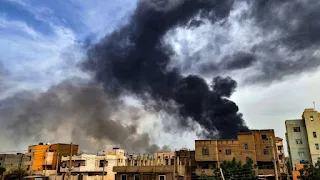A massive fire broke out south of Khartoum, following violent clashes between the Sudanese army and the Rapid Support Forces over control of a weapons factory. As the situation worsens and deteriorates in the country, with the clashes entering its eighth week.
Witnesses said that a huge fire broke out on Wednesday near a military complex that includes a weapons factory in southern Khartoum, which the Sudanese army is fighting to defend in one of its fiercest battles against the paramilitary Rapid Support Forces in weeks.
Witnesses added that the Rapid Support Forces attacked the sprawling, heavily guarded Yarmouk compound on Tuesday. On Wednesday, these forces published video clips in which they said they had seized a warehouse full of weapons and ammunition, as well as a number of entry points to the site.
Witnesses stated that the army launched air strikes in an attempt to repel the advance of the RSF.
Fighting has raged in the three cities that make up the greater metropolitan area, Khartoum, Bahri and Omdurman, since a 12-day ceasefire officially ended on June 3 after it was repeatedly violated.
Activists in the area said that the fires were caused by the bombing of fuel and gas depots, and that houses in the area were hit by shells and stray bullets.
Residents of Omdurman and Bahri, about 15 kilometers away, reported seeing flames after dark in Yarmouk.
The Rapid Support Forces quickly took control of swathes of the capital after the war broke out in Khartoum on April 15. The army's air strikes and artillery did not succeed in driving them out, but as the fighting continues, the RSF will likely face a challenge in terms of replenishing its stocks of ammunition and fuel.
The conflict obstructed steps to transition to civilian rule four years after a popular uprising toppled President Omar al-Bashir. The dispute arose between the army and the Rapid Support Forces, after they jointly carried out a coup in 2021, over the chain of command and plans to restructure the army during the transitional period.
Water shortage
The conflict caused chaos and destruction in the capital and sparked new waves of violence in the western Darfur region, which has already been in turmoil for a long time, and caused the displacement of more than 1.9 million people.
Most health services and the banking system have collapsed, electricity and water supplies are frequently cut off, and looting is rampant. Food supplies are dwindling.
The United Nations Children's Fund (UNICEF) said on Wednesday that about 297 children had been evacuated from the Maigoma orphanage in Khartoum, which is located in an area witnessing violent confrontations.
Dozens of children have died in the home since the war began due to dehydration and malnutrition. The home was home to about 400 children before the outbreak of the conflict.
Activists in Bahri said that many people have been displaced from their homes as a result of repeated water cuts for more than 50 days, only to find themselves facing the flames of war while searching for water.
More than 1.4 million people have been displaced from their homes inside Sudan, while another 476,800 have fled to neighboring countries, most of which are already suffering from poverty and internal conflicts, according to estimates published by the International Organization for Migration on Tuesday.
The Sudanese Ministry of Health recorded the deaths of at least 780 civilians as a direct result of the conflict.
Hundreds more were killed in El Geneina, West Darfur state. Medical officials say a large number of bodies have yet to be collected or registered.
In the Saudi city of Jeddah, one of the mediators said that negotiations are continuing with representatives of both parties in an attempt to secure humanitarian access.
The ceasefire, which ended on Saturday, was brokered by Saudi Arabia and the United States during the talks hosted by the kingdom.
A source said that the consultations related to reaching a new ceasefire agreement are still at an early stage and are complicated by the continuing fighting.
Countries including the United States, Saudi Arabia, the UAE, and the European Union said in a joint statement, "We urgently call on the warring parties to abide by their commitments and return to the Jeddah dialogue to resolve issues related to violations and reach a ceasefire that is fully respected."
The United Nations says about 25 million people, more than half of Sudan's population, need humanitarian aid, although enough aid has been allowed in for about 2.2 million since late May.
Tags:
africaaustralia





